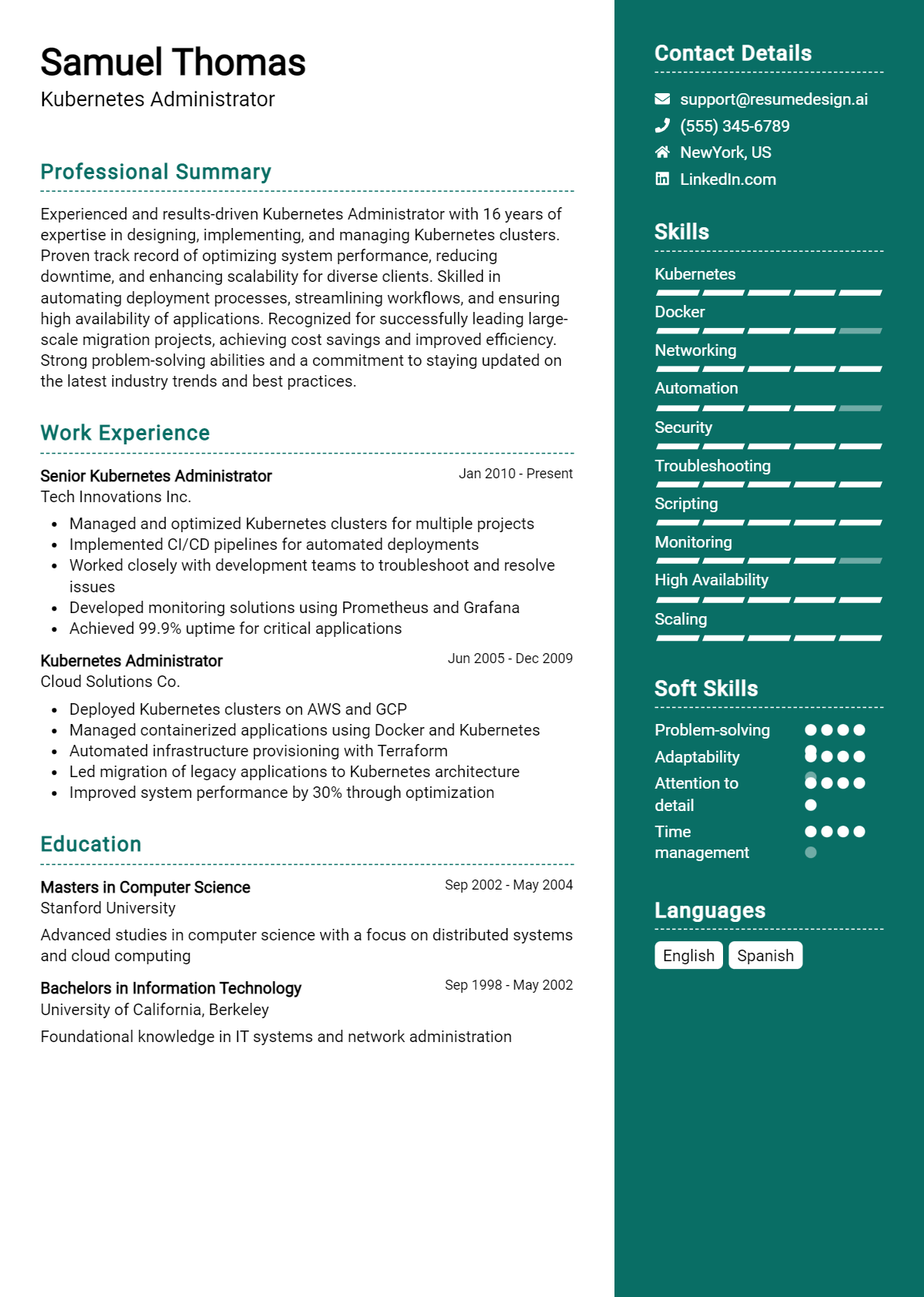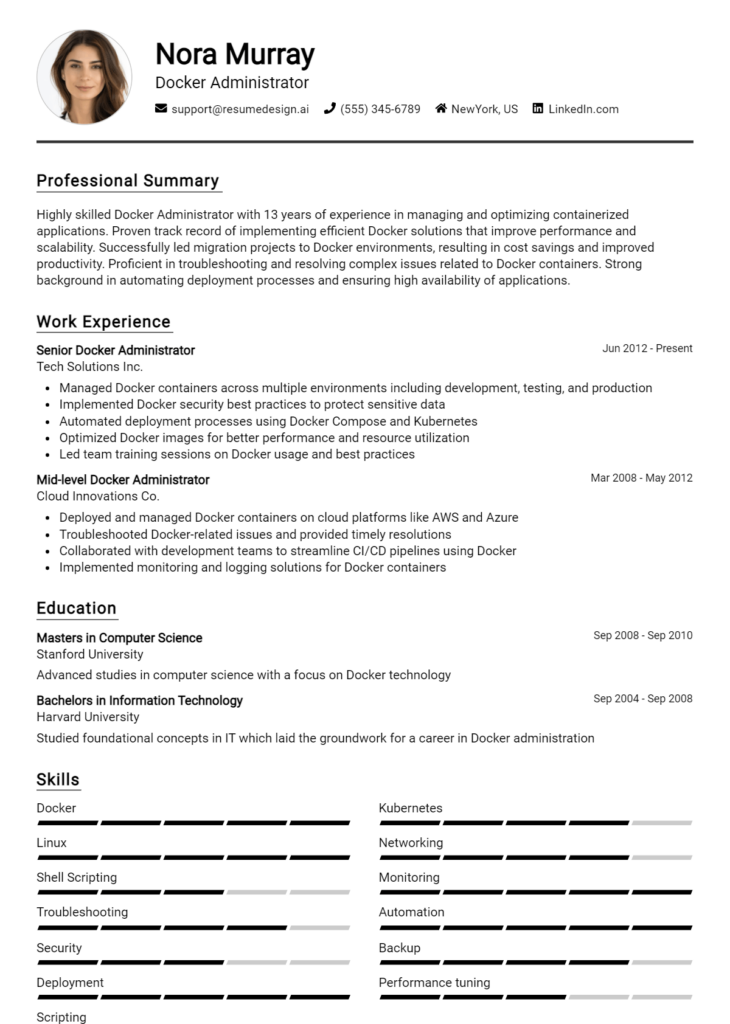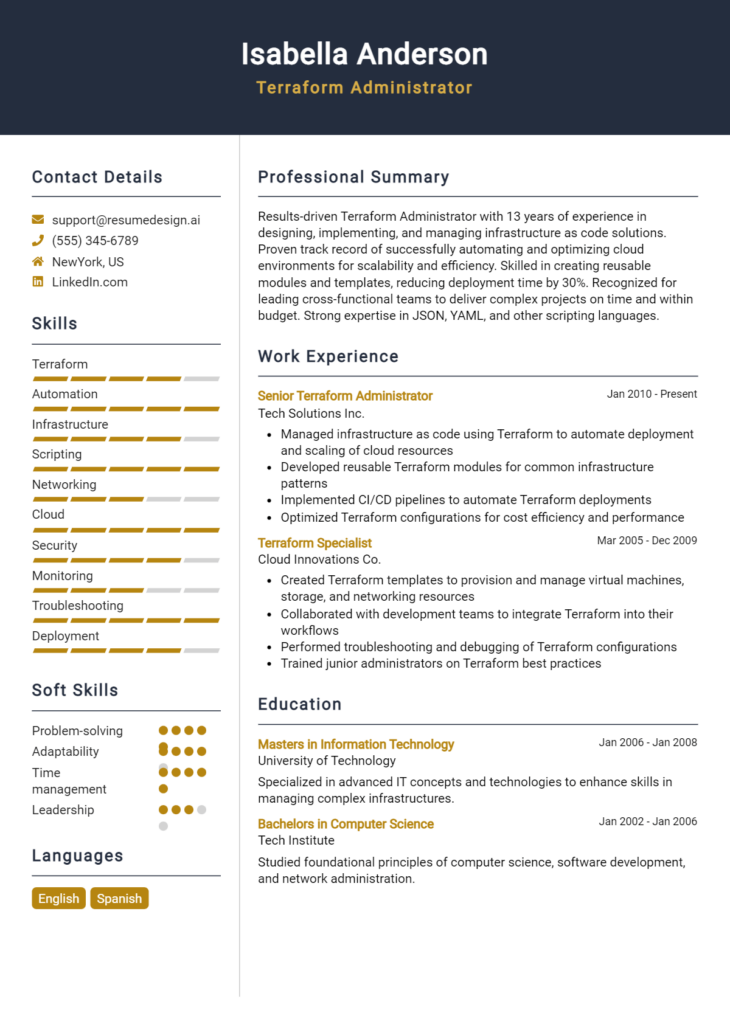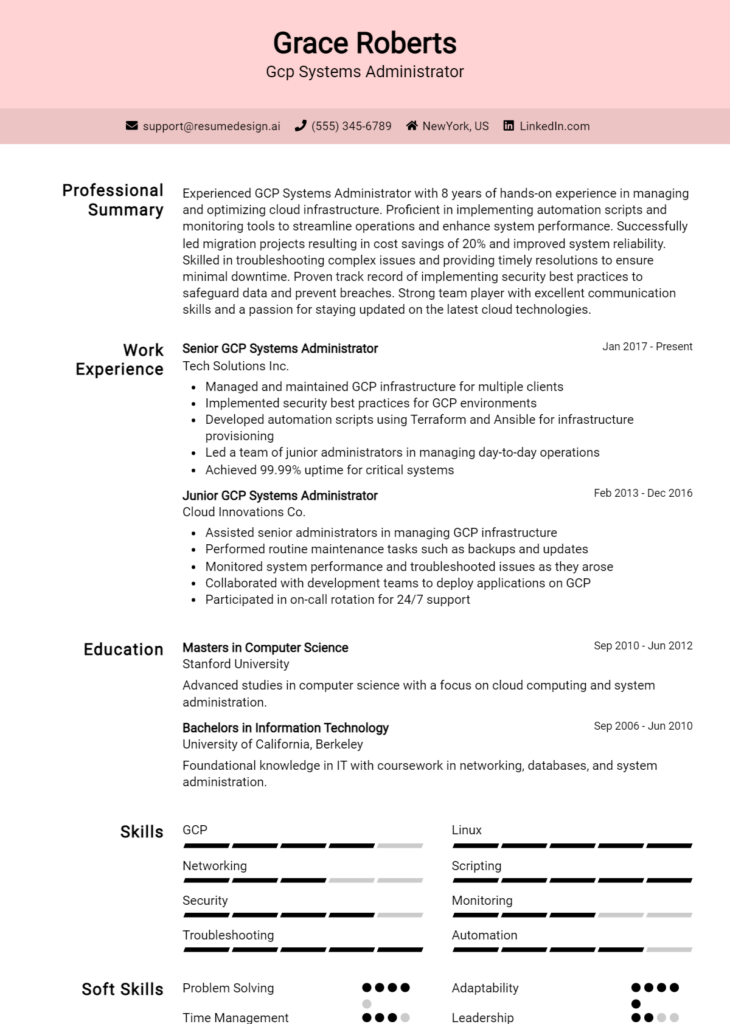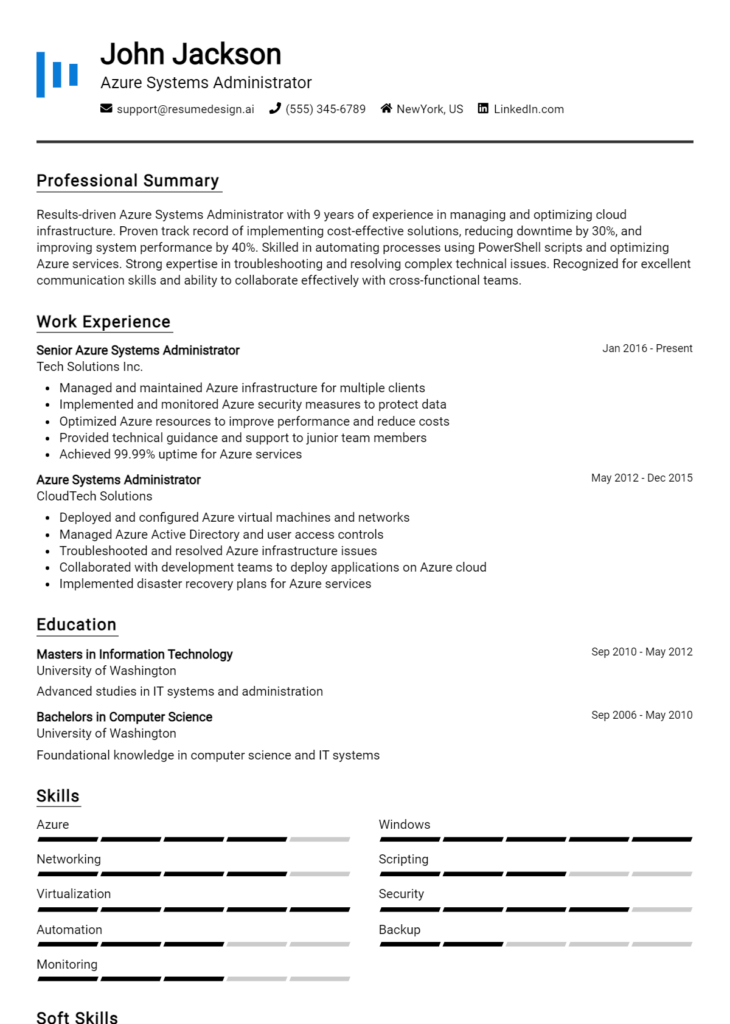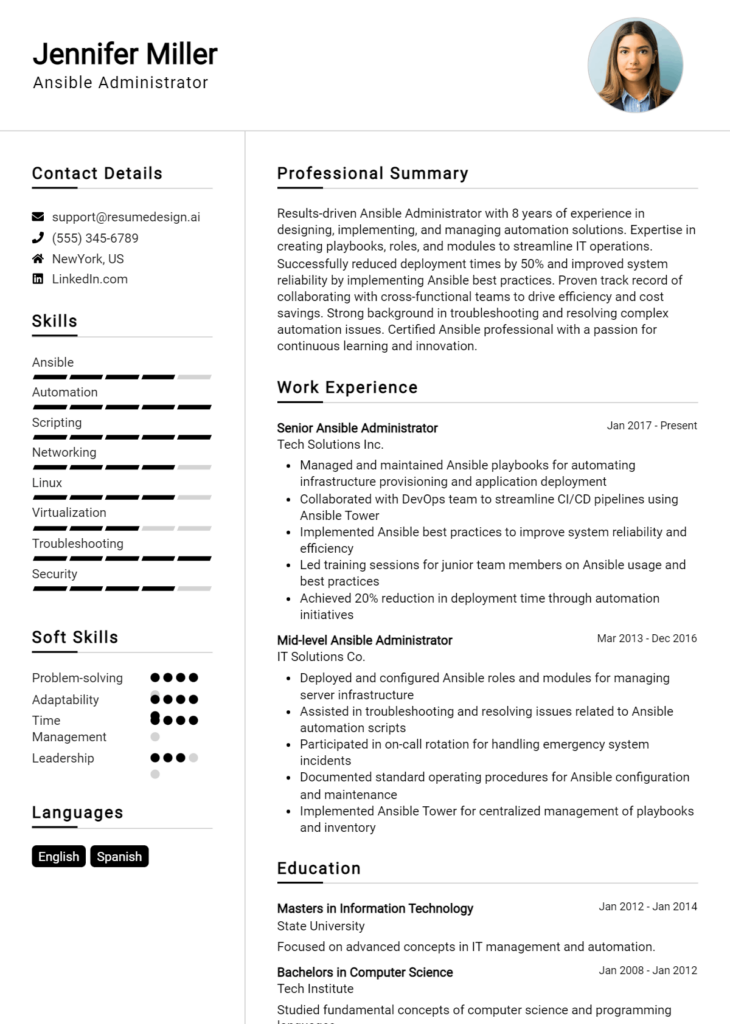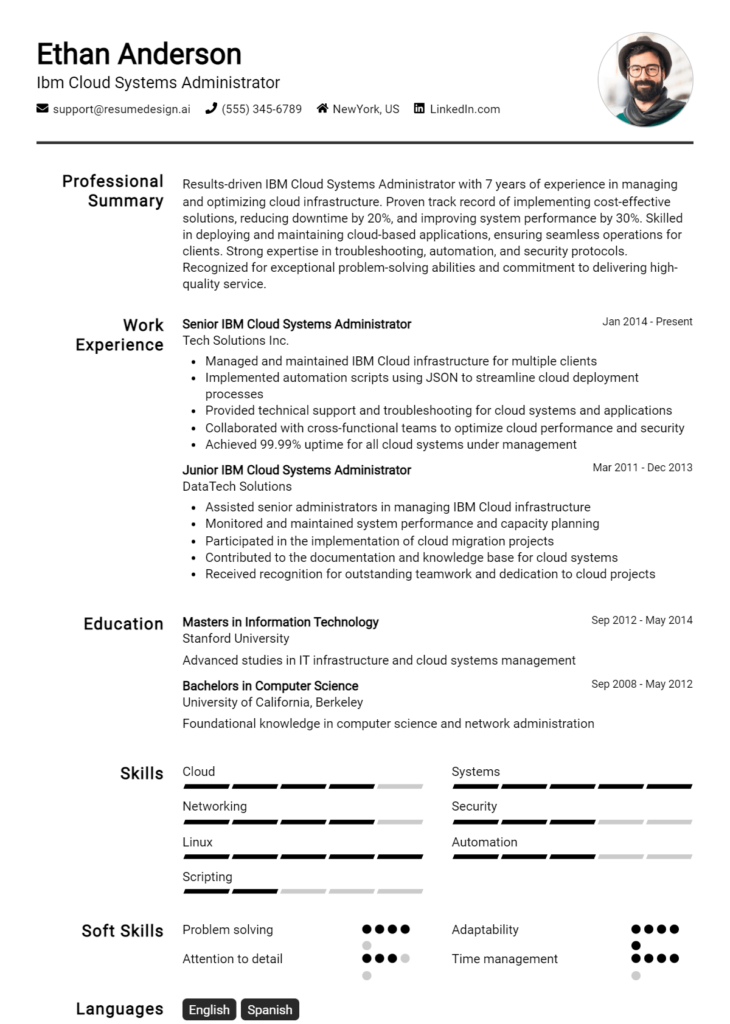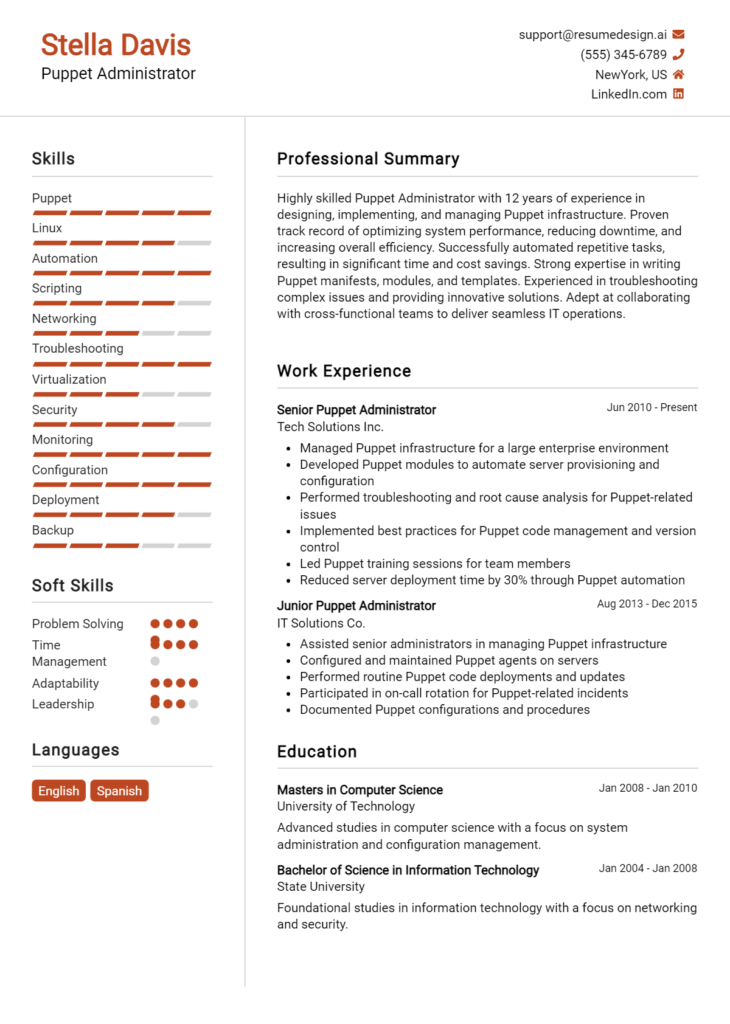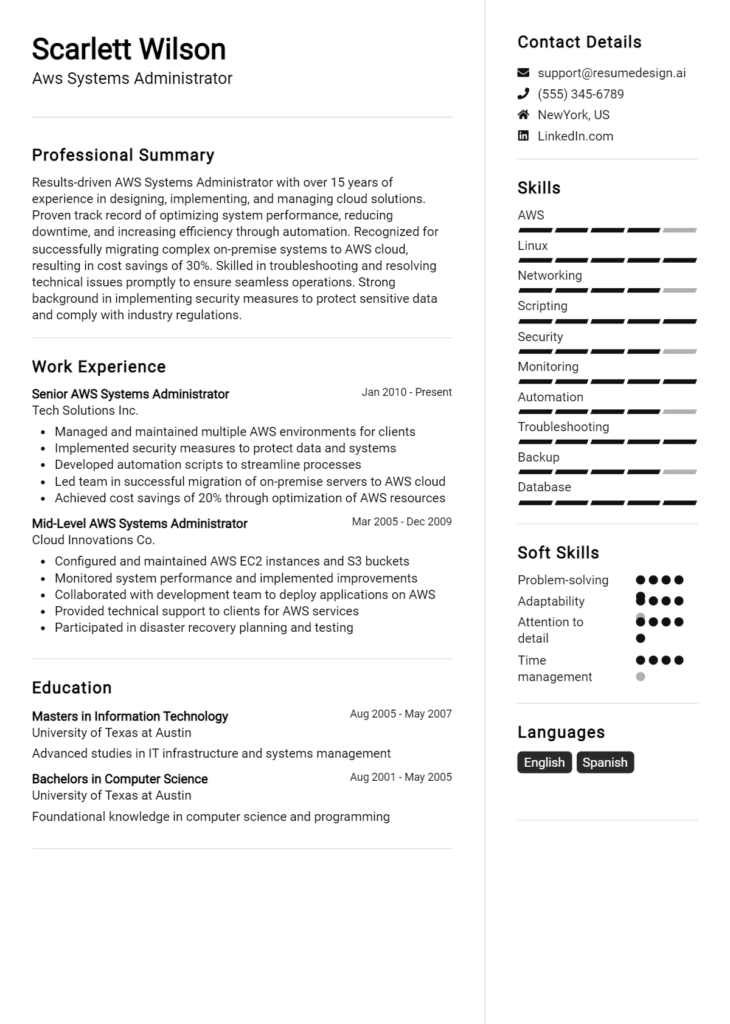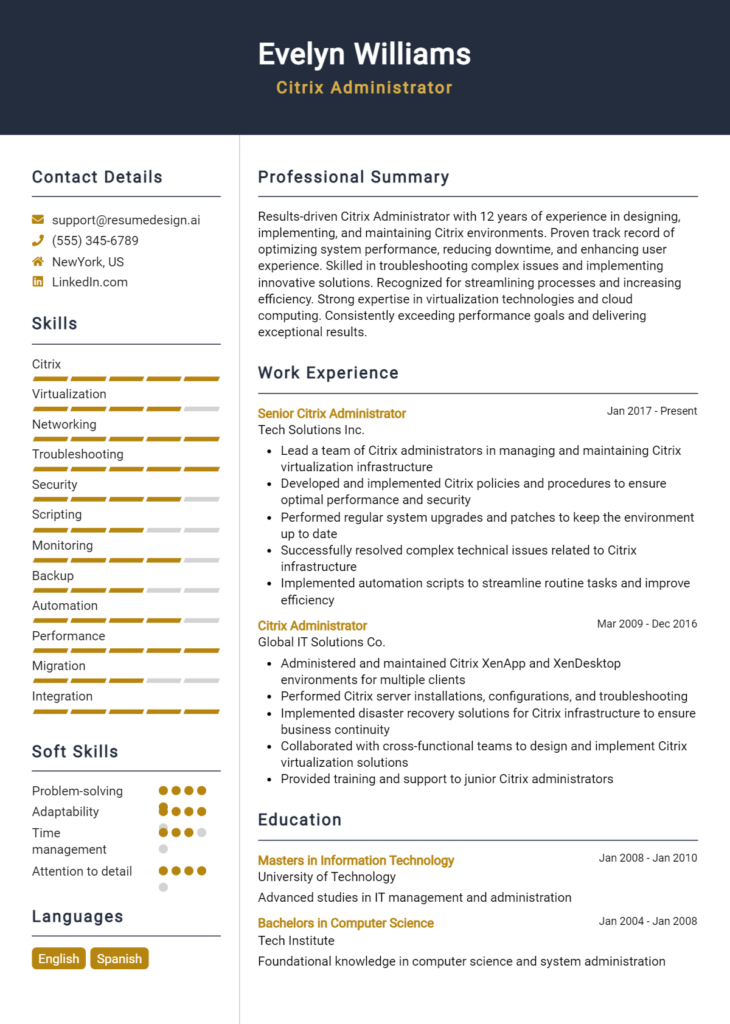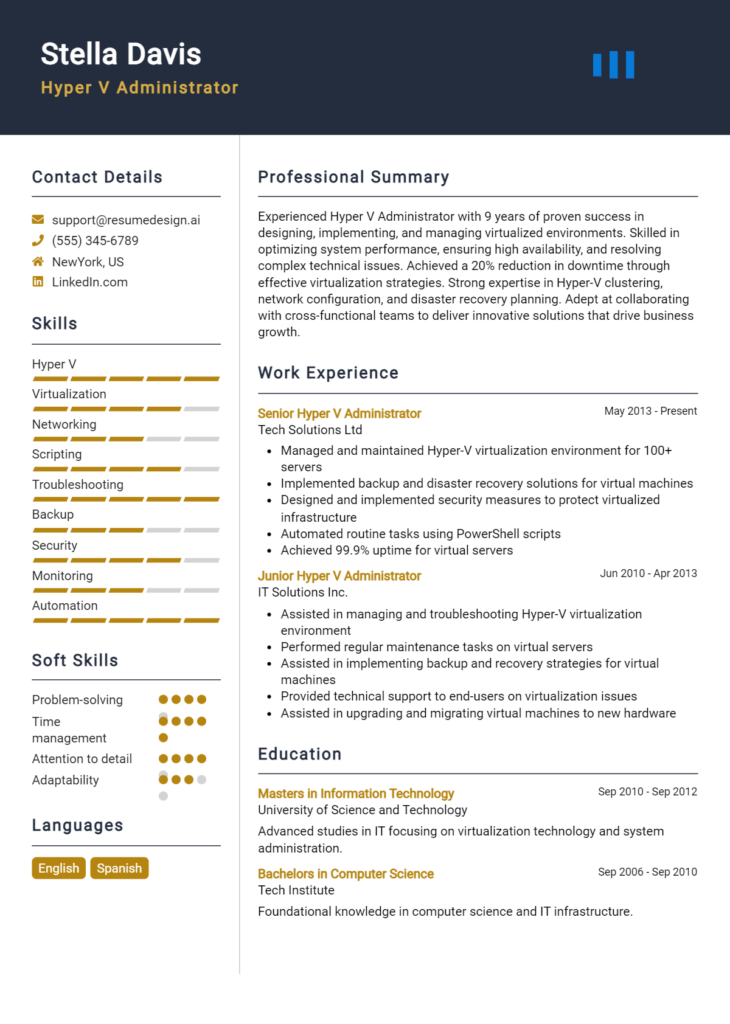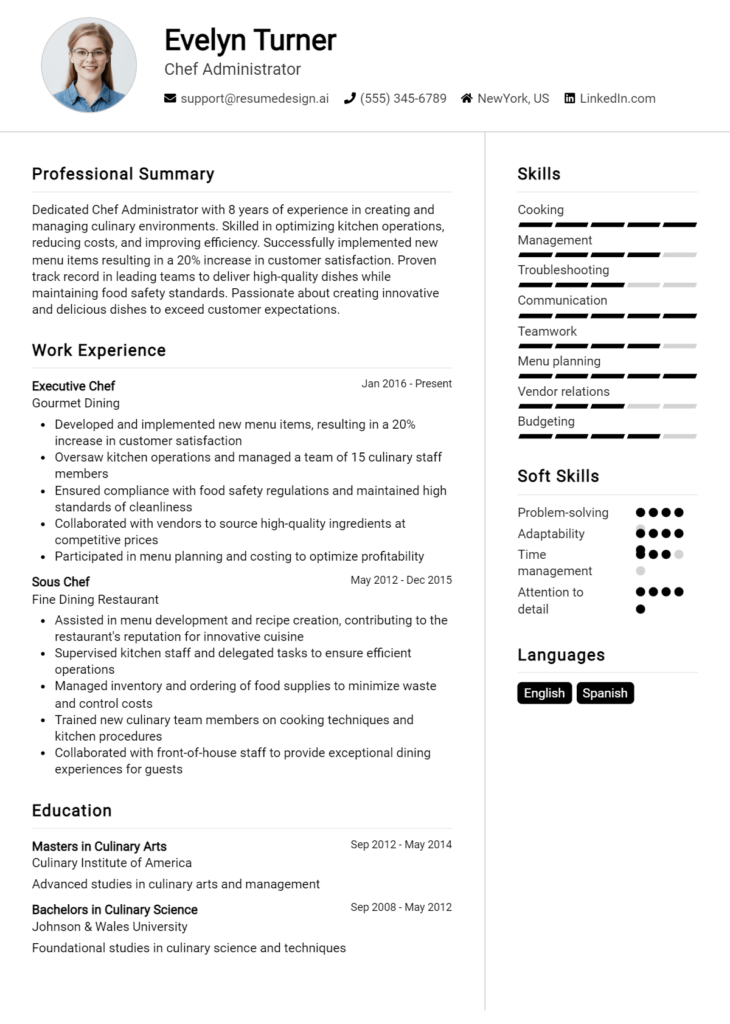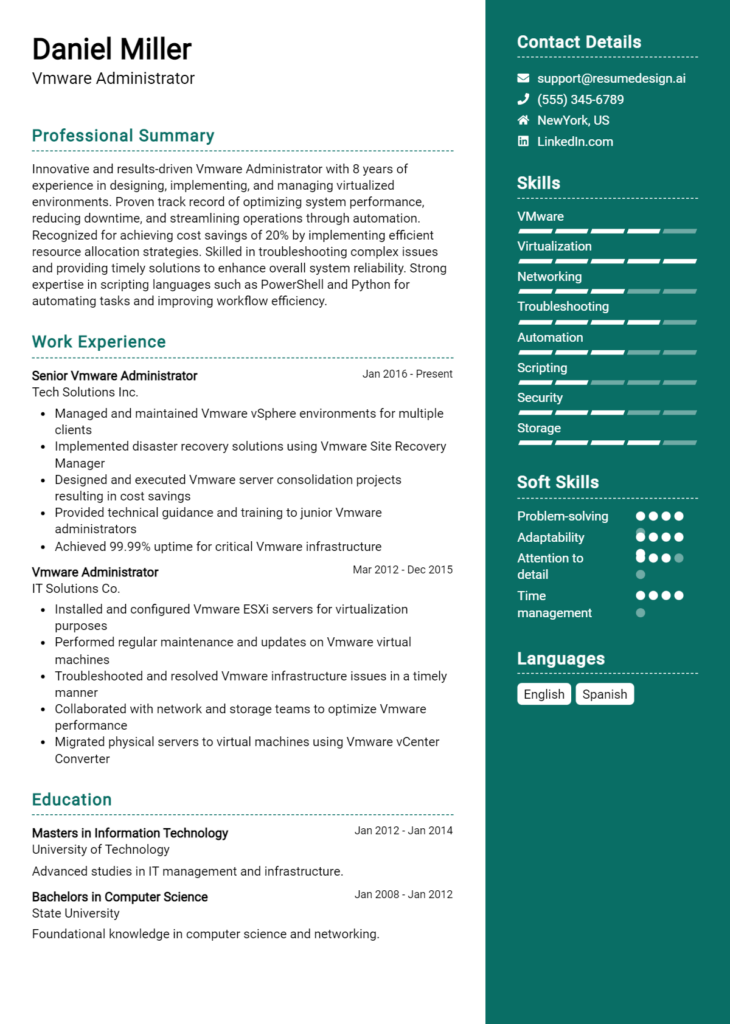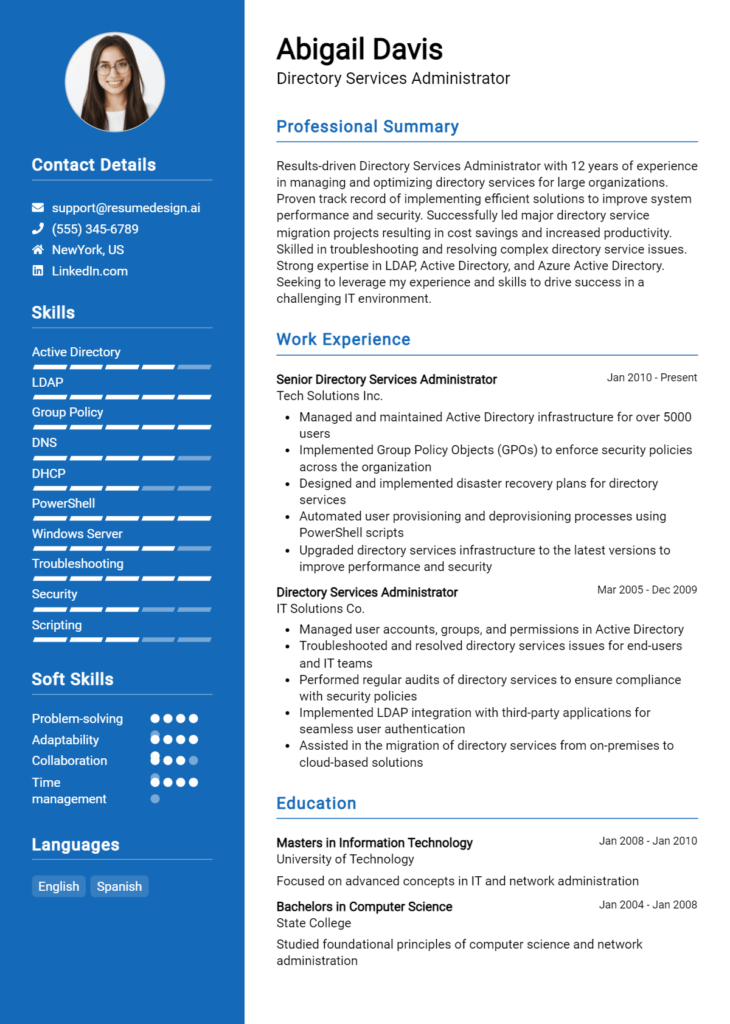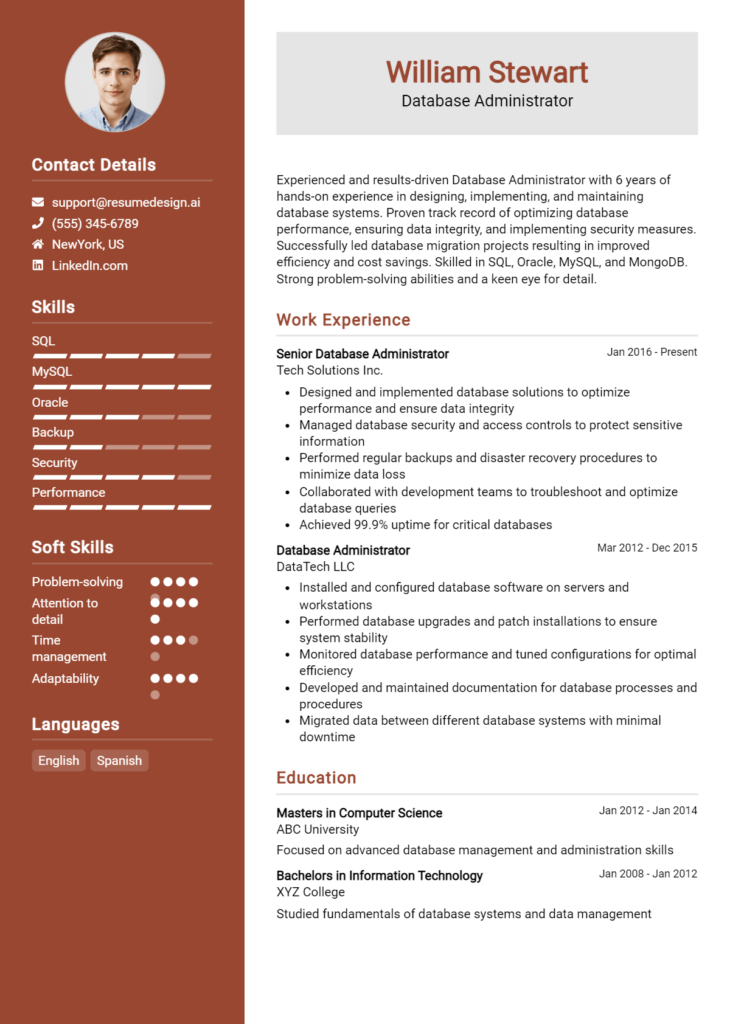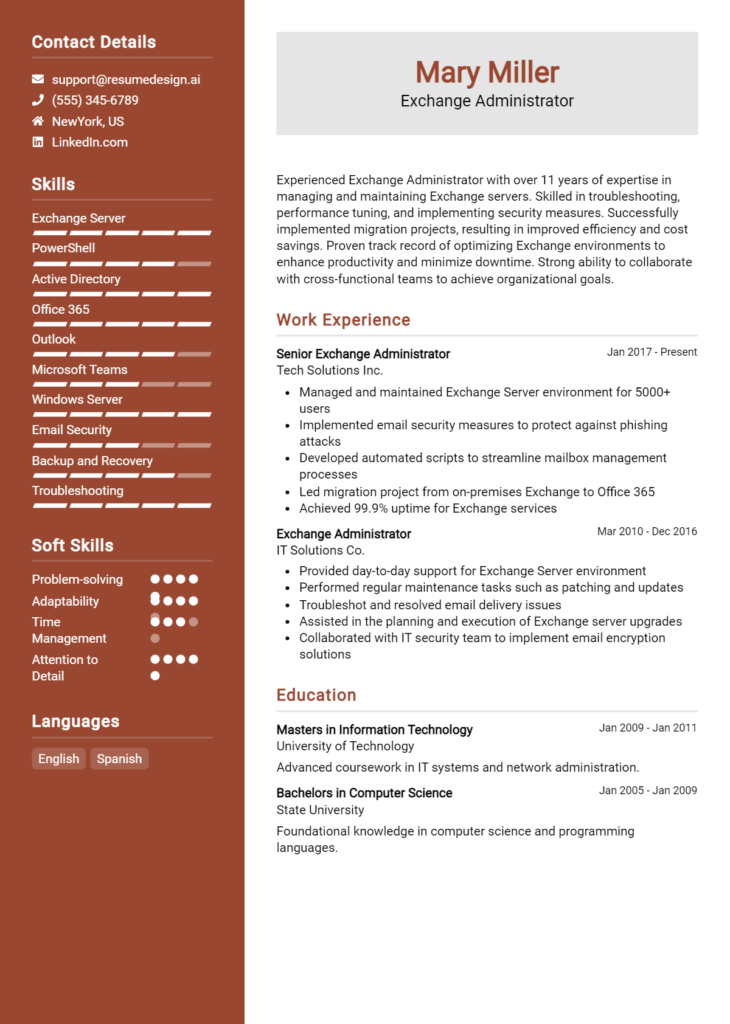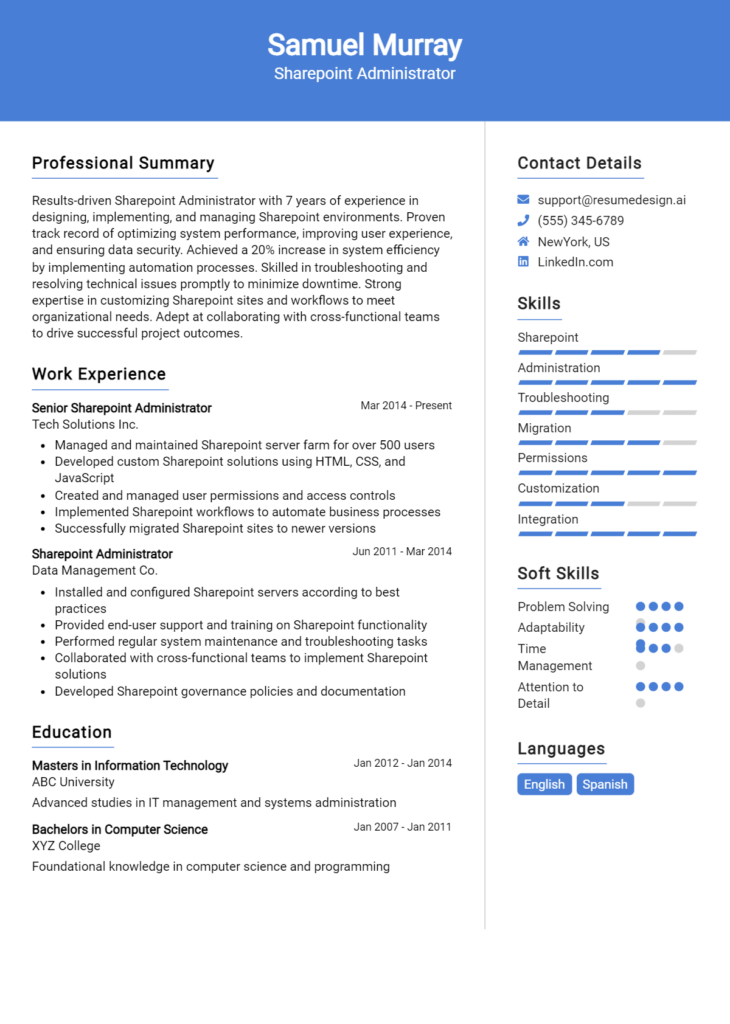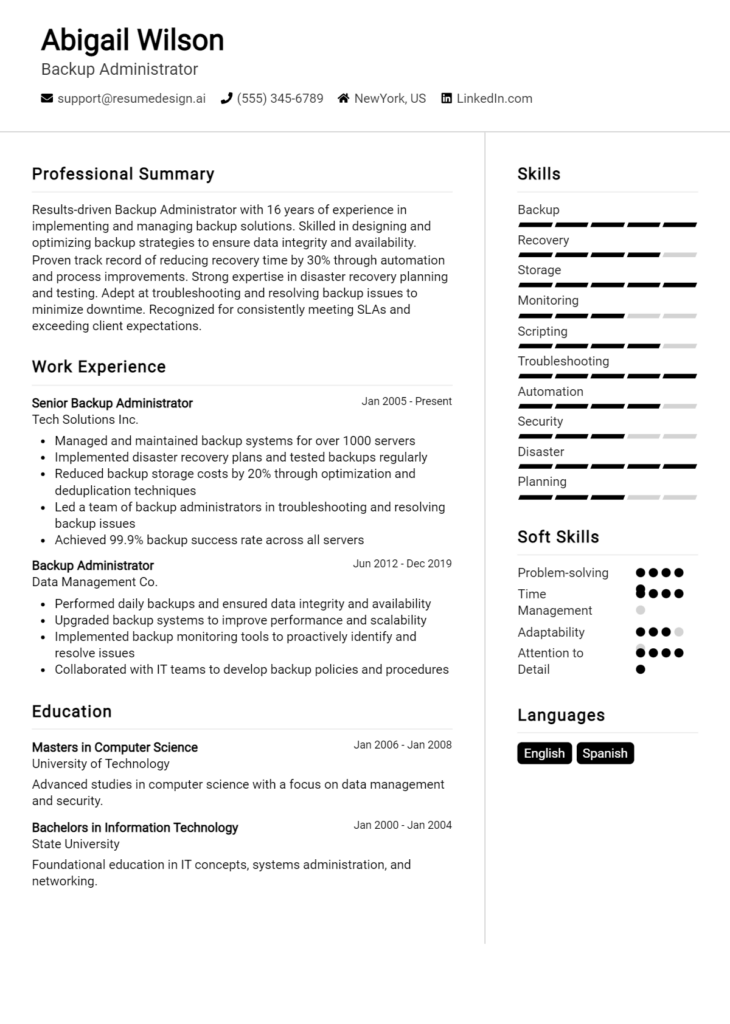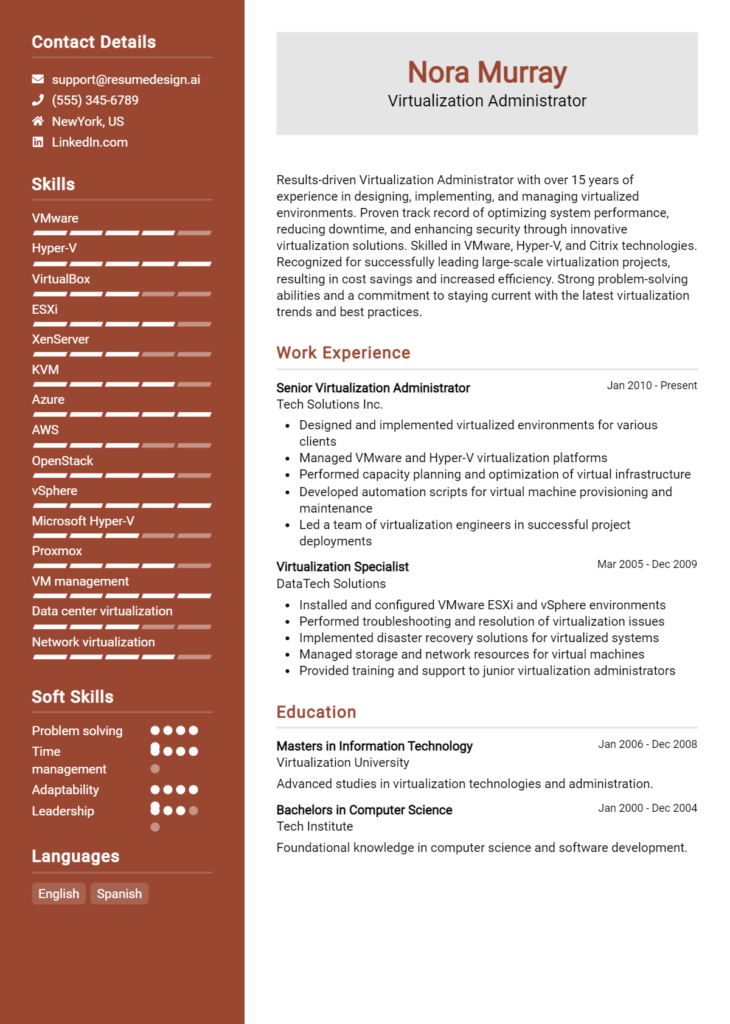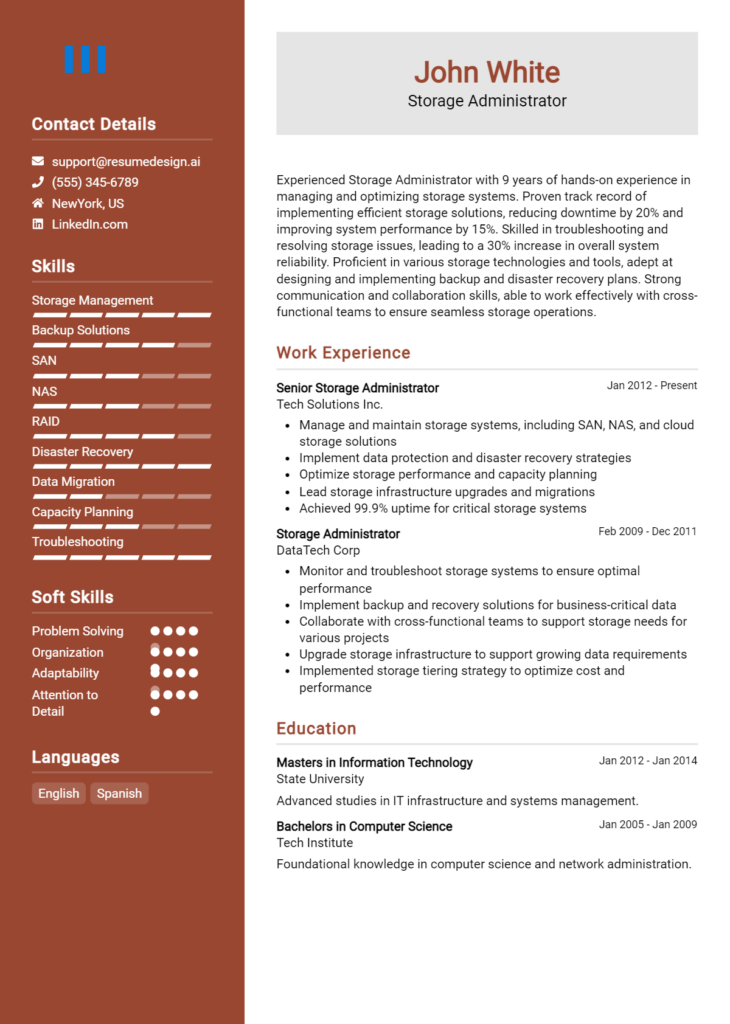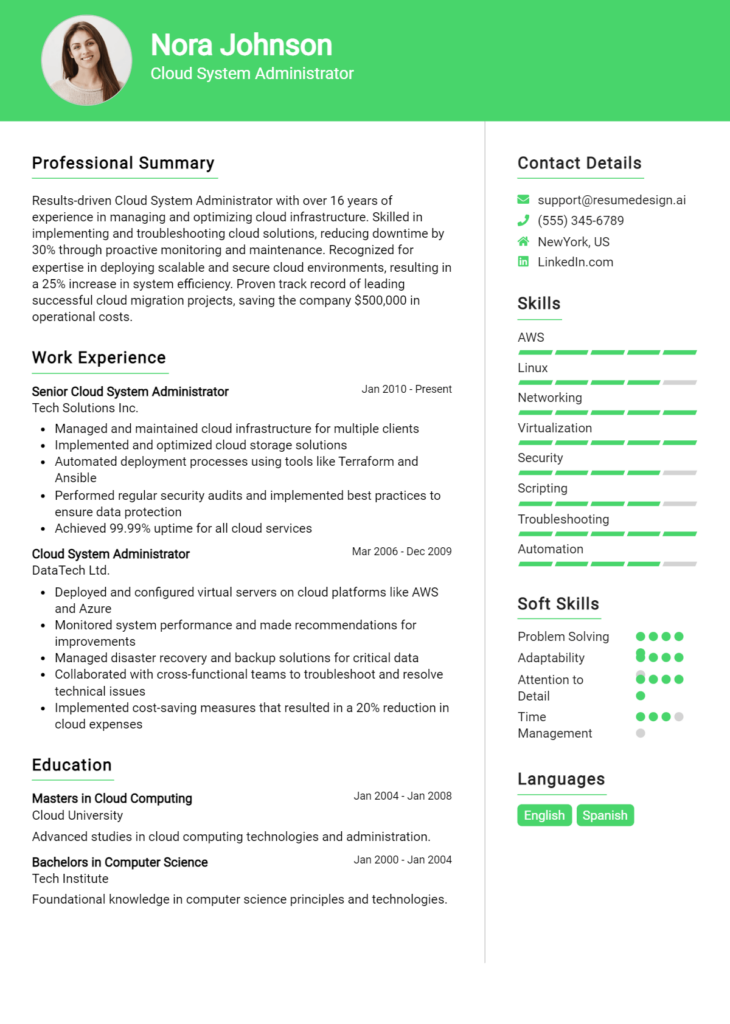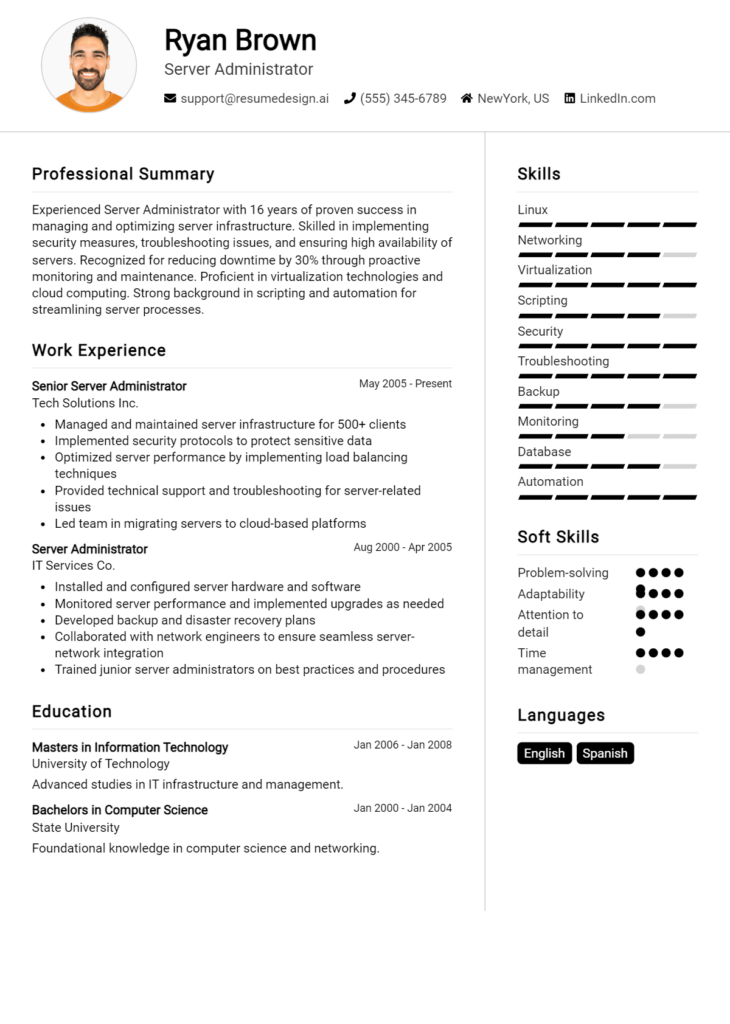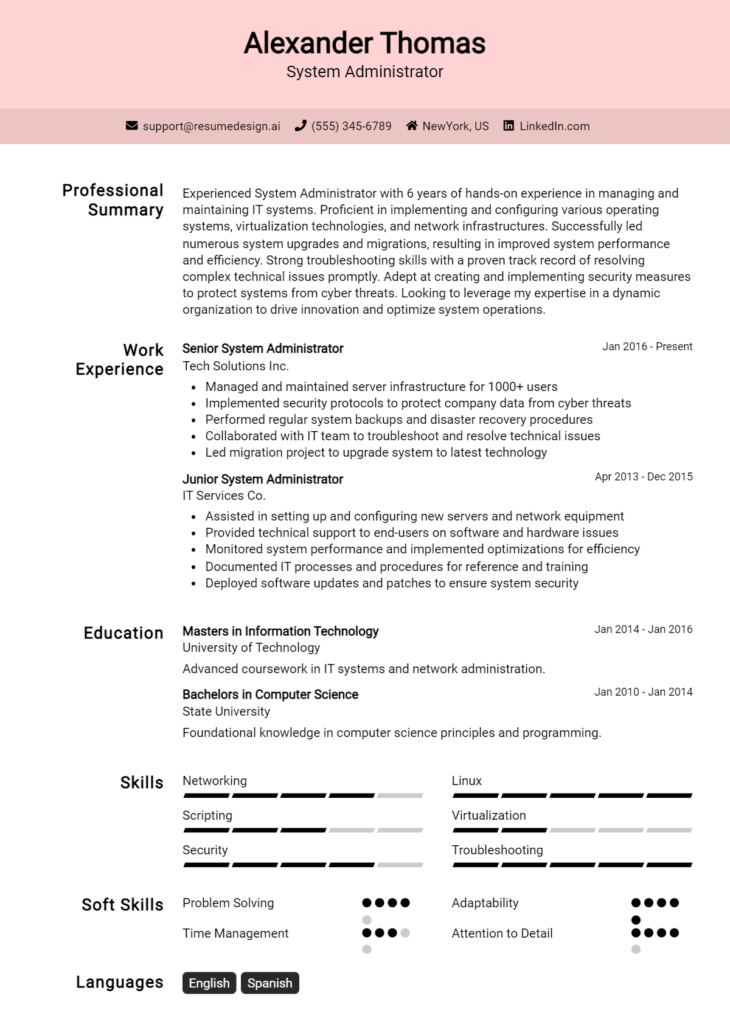Kubernetes Administrator Core Responsibilities
A Kubernetes Administrator plays a crucial role in managing container orchestration, ensuring seamless deployment, scaling, and operation of applications on Kubernetes clusters. This position requires strong technical skills in cloud infrastructure, networking, and automation, as well as exceptional problem-solving abilities to address operational challenges. By collaborating with development, operations, and security teams, the Kubernetes Administrator helps align IT capabilities with organizational goals, enhancing productivity and efficiency. A well-structured resume that highlights these competencies can significantly increase job prospects.
Common Responsibilities Listed on Kubernetes Administrator Resume
- Deploy and manage Kubernetes clusters across various environments.
- Monitor cluster performance and troubleshoot issues to ensure high availability.
- Automate deployment processes using CI/CD pipelines.
- Implement and manage security policies for Kubernetes environments.
- Collaborate with development teams to optimize application performance.
- Conduct regular backups and disaster recovery planning.
- Stay updated with the latest Kubernetes features and best practices.
- Provide training and support for team members on Kubernetes usage.
- Manage resource allocation and utilization in clusters.
- Document configurations and procedures for future reference.
- Integrate monitoring and logging solutions for performance insights.
High-Level Resume Tips for Kubernetes Administrator Professionals
In today's competitive job market, a well-crafted resume is essential for Kubernetes Administrator professionals seeking to make a lasting impression on potential employers. Your resume is often the first point of contact between you and a hiring manager, and it serves as a powerful tool to showcase your skills, achievements, and unique qualifications. A compelling resume not only highlights your technical expertise in Kubernetes and container orchestration but also demonstrates your ability to solve complex problems and contribute to a team's success. This guide will provide practical and actionable resume tips specifically tailored for Kubernetes Administrator professionals to help you stand out in a crowded field.
Top Resume Tips for Kubernetes Administrator Professionals
- Tailor your resume for each job application by aligning your skills and experiences with the specific job description.
- Highlight relevant experience in Kubernetes and container management, focusing on roles where you've successfully implemented or maintained Kubernetes clusters.
- Quantify your achievements to demonstrate the impact of your work, such as improving deployment times by X% or reducing downtime by Y hours.
- Include industry-specific skills such as knowledge of CI/CD pipelines, cloud services (AWS, Azure, GCP), and containerization tools (Docker, OpenShift).
- Showcase certifications related to Kubernetes, such as Certified Kubernetes Administrator (CKA) or Certified Kubernetes Application Developer (CKAD).
- Utilize action verbs and concise language to convey your responsibilities and accomplishments effectively.
- Incorporate relevant keywords from the job description to help your resume pass through Applicant Tracking Systems (ATS).
- Demonstrate your soft skills, such as teamwork and communication, by providing examples of cross-functional collaboration on projects.
- Keep your resume format clean and professional, ensuring it is easy to read and well-organized.
- Include a section for continuous learning, showcasing any recent training, workshops, or conferences you've attended related to Kubernetes and cloud technologies.
By implementing these tips, Kubernetes Administrator professionals can significantly enhance their resumes, thereby increasing their chances of landing interviews and securing job offers in this high-demand field. A strong resume not only reflects your technical abilities but also your commitment to professional growth and excellence in the Kubernetes ecosystem.
Why Resume Headlines & Titles are Important for Kubernetes Administrator
The role of a Kubernetes Administrator is pivotal in managing containerized applications and ensuring seamless orchestration within cloud environments. A well-crafted resume headline or title is crucial, as it serves as the first impression for hiring managers. It encapsulates a candidate’s key qualifications, skills, and experiences in a concise and impactful manner. A strong headline can immediately grab attention, distinguish the candidate from others, and succinctly convey their value proposition related to the specific position they are applying for. Therefore, creating a relevant and compelling resume headline is essential for effectively communicating expertise in Kubernetes administration.
Best Practices for Crafting Resume Headlines for Kubernetes Administrator
- Keep it concise: Aim for a headline that is brief yet informative.
- Be role-specific: Tailor the headline to reflect the specific position of Kubernetes Administrator.
- Highlight key skills: Include essential skills relevant to Kubernetes administration.
- Use impactful language: Choose powerful words that convey expertise and confidence.
- Include years of experience: Mention the number of years in the field to establish credibility.
- Showcase certifications: If applicable, reference relevant certifications in the title.
- Avoid jargon: Use language that is easily understandable to a broad audience.
- Make it unique: Differentiate yourself from others by avoiding generic phrases.
Example Resume Headlines for Kubernetes Administrator
Strong Resume Headlines
"Certified Kubernetes Administrator with 5 Years of DevOps Experience"
"Skilled Kubernetes Expert Specializing in Cloud-Native Application Deployment"
"Results-Driven Kubernetes Administrator with Proven Track Record in Performance Optimization"
Weak Resume Headlines
“IT Professional Seeking Opportunities”
“Kubernetes Administrator”
Strong resume headlines are effective because they immediately convey the candidate's unique strengths and qualifications while aligning with the job role. They leverage impactful language and specific details to catch the eye of hiring managers, making it easier for them to identify the candidate’s fit for the position. In contrast, weak headlines lack specificity and do not clearly communicate the candidate's expertise or value, making them less memorable and failing to engage the reader.
Writing an Exceptional Kubernetes Administrator Resume Summary
A well-crafted resume summary is crucial for a Kubernetes Administrator as it serves as the first impression on hiring managers, quickly highlighting the candidate's key skills, relevant experience, and notable accomplishments in the field. A strong summary not only captures attention but also succinctly communicates the candidate's value proposition tailored to the specific role they are applying for. It should be concise yet impactful, allowing hiring managers to quickly assess the candidate's fit for the position and prompting them to delve deeper into the resume.
Best Practices for Writing a Kubernetes Administrator Resume Summary
- Quantify Achievements: Use numbers and statistics to demonstrate the impact of your work, such as reduced deployment times or increased system uptime.
- Focus on Skills: Highlight specific technical skills relevant to Kubernetes administration, such as container orchestration, cluster management, and CI/CD pipelines.
- Tailor the Summary: Customize the summary for each job application, aligning your experience and skills with the job description provided by the employer.
- Keep it Concise: Aim for 3-4 sentences that convey your key qualifications without overwhelming the reader.
- Use Action Verbs: Start sentences with strong action verbs to convey a sense of proactivity and achievement.
- Showcase Relevant Experience: Mention years of experience or significant projects that directly relate to Kubernetes administration.
- Highlight Certifications: If applicable, include certifications like Certified Kubernetes Administrator (CKA) to bolster your qualifications.
- Express Passion for Technology: Convey enthusiasm for Kubernetes and cloud technologies to show your commitment to the field.
Example Kubernetes Administrator Resume Summaries
Strong Resume Summaries
Dynamic Kubernetes Administrator with over 5 years of experience in deploying, managing, and optimizing containerized applications. Successfully reduced deployment times by 30% through the implementation of automated CI/CD pipelines and improved system reliability, achieving 99.9% uptime.
Results-driven Kubernetes expert with a proven track record of managing large-scale clusters and enhancing application performance across cloud environments. Achieved a 40% increase in resource efficiency by fine-tuning cluster configurations and implementing monitoring solutions.
Dedicated Kubernetes Administrator with a strong background in cloud-native application development and microservices architecture. Led a cross-functional team to migrate legacy applications to Kubernetes, resulting in a 25% reduction in infrastructure costs.
Weak Resume Summaries
Kubernetes Administrator with some experience in managing containers and cloud platforms. Looking for a new opportunity to grow in the field.
Experienced IT professional with knowledge of Kubernetes and related technologies. Seeking to leverage skills in a challenging role.
The examples of strong resume summaries stand out due to their specificity and quantifiable results, clearly demonstrating the candidate's impact in previous roles and aligning closely with the expectations of hiring managers. In contrast, the weak summaries lack detail, specificity, and measurable outcomes, making them less compelling and memorable for potential employers.
Work Experience Section for Kubernetes Administrator Resume
The work experience section of a Kubernetes Administrator resume is a critical component that showcases a candidate's technical proficiency and their ability to lead teams in deploying and managing Kubernetes environments. This section not only highlights the candidate's hands-on experience with container orchestration but also their capacity to deliver high-quality products under pressure. By quantifying achievements and aligning experiences with industry standards, candidates can effectively demonstrate their value to potential employers, providing concrete evidence of their skills and contributions to successful projects.
Best Practices for Kubernetes Administrator Work Experience
- Highlight specific Kubernetes tools and technologies used, such as Helm, Kubectl, and CI/CD pipelines.
- Quantify achievements with metrics, such as reduced deployment times or increased system uptime.
- Emphasize collaboration with cross-functional teams, including developers, QA, and operations.
- Detail any leadership roles or mentorship experiences in guiding junior team members.
- Focus on problem-solving skills by describing challenges faced and solutions implemented.
- Include relevant certifications or training that support your experience and knowledge in Kubernetes.
- Use action verbs to convey your contributions and impact within the organizations.
- Align your experiences with the specific requirements of the job you are applying for, making it relevant to the prospective employer.
Example Work Experiences for Kubernetes Administrator
Strong Experiences
- Led a team of 5 engineers to migrate 50+ applications to Kubernetes, resulting in a 40% reduction in deployment times.
- Implemented a CI/CD pipeline using Jenkins and Helm, increasing deployment frequency from bi-weekly to daily.
- Collaborated with the security team to enhance pod security policies, reducing vulnerabilities by 30% across all clusters.
- Designed and executed a disaster recovery plan that improved system recovery time from 4 hours to 30 minutes.
Weak Experiences
- Worked with Kubernetes on various projects.
- Assisted in managing cloud infrastructure.
- Participated in team meetings about Kubernetes strategies.
- Helped troubleshoot issues in containerized applications.
The strong experiences listed above are considered impactful because they provide specific and quantifiable outcomes, demonstrating the candidate's leadership skills and technical expertise in Kubernetes administration. In contrast, the weak experiences lack detail and measurable results, making it difficult for potential employers to assess the candidate's actual contributions or capabilities in a Kubernetes environment.
Education and Certifications Section for Kubernetes Administrator Resume
The education and certifications section of a Kubernetes Administrator resume is crucial as it showcases the candidate's academic background and industry-relevant credentials. This section not only highlights formal education but also emphasizes the importance of continuous learning through certifications and specialized training. By providing relevant coursework and recognized certifications, candidates can significantly enhance their credibility and demonstrate their alignment with the specific requirements of the Kubernetes Administrator role, making a compelling case to potential employers.
Best Practices for Kubernetes Administrator Education and Certifications
- Include only relevant degrees and certifications that pertain to Kubernetes and cloud technologies.
- List certifications in order of relevance, starting with the most recognized and respected in the industry.
- Provide detailed information on certification levels (e.g., Associate, Professional) to indicate expertise.
- Highlight any specialized training or workshops attended that are pertinent to Kubernetes administration.
- Incorporate key coursework that directly relates to Kubernetes, container orchestration, or cloud computing.
- Update the section regularly to reflect new certifications or educational achievements.
- Use clear and concise formatting to ensure easy readability for hiring managers.
- Consider including online courses or MOOCs from reputable platforms if they are relevant to the role.
Example Education and Certifications for Kubernetes Administrator
Strong Examples
- Bachelor of Science in Computer Science, XYZ University
- Certified Kubernetes Administrator (CKA), Cloud Native Computing Foundation
- Google Cloud Professional Kubernetes Administrator Certification
- Relevant Coursework: Cloud Architecture, Containerization and Orchestration, DevOps Practices
Weak Examples
- Associate Degree in General Studies, ABC College
- CompTIA A+ Certification (not relevant to Kubernetes)
- Outdated certification: MCSE (Microsoft Certified Solutions Expert) from 2015
- High School Diploma
The strong examples are considered effective because they directly align with the requirements and skills necessary for a Kubernetes Administrator. They showcase relevant degrees, industry-recognized certifications, and specialized coursework that enhance the candidate's qualifications. In contrast, the weak examples lack relevance to the Kubernetes role, featuring outdated or general qualifications that do not demonstrate the specialized knowledge and skills required for success in this position.
Top Skills & Keywords for Kubernetes Administrator Resume
A well-crafted resume is essential for any Kubernetes Administrator, as it serves as a gateway to showcasing your expertise in managing container orchestration platforms. The importance of highlighting the right skills cannot be overstated; they demonstrate your ability to effectively maintain and optimize Kubernetes clusters. In a competitive job market, both hard and soft skills play a crucial role in making your resume stand out. Hard skills reflect your technical abilities and knowledge, while soft skills underline your interpersonal qualities and problem-solving capabilities. Together, they create a comprehensive picture of your qualifications, making it easier for potential employers to see the value you can bring to their organization.
Top Hard & Soft Skills for Kubernetes Administrator
Soft Skills
- Problem-solving
- Communication
- Team collaboration
- Adaptability
- Attention to detail
- Time management
- Critical thinking
- Conflict resolution
- Leadership
- Creativity
Hard Skills
- Kubernetes architecture
- Containerization (Docker)
- CI/CD pipelines
- Cloud platforms (AWS, Azure, GCP)
- Networking concepts
- Monitoring and logging (Prometheus, Grafana)
- Scripting languages (Python, Bash)
- Infrastructure as Code (Terraform, Ansible)
- Security best practices
- Troubleshooting and debugging
For a deeper dive into the skills relevant to Kubernetes Administration and how to effectively present your work experience, explore these resources to refine your resume further.
Stand Out with a Winning Kubernetes Administrator Cover Letter
Dear Hiring Manager,
I am writing to express my interest in the Kubernetes Administrator position at [Company Name], as advertised on [Job Board/Company Website]. With a solid background in container orchestration, cloud infrastructure management, and a passion for optimizing deployment processes, I am confident in my ability to contribute effectively to your team. My hands-on experience with Kubernetes, coupled with my dedication to continuous learning in the ever-evolving world of cloud technologies, aligns perfectly with the goals of your organization.
In my previous role at [Previous Company Name], I was responsible for managing a multi-cluster Kubernetes environment, where I streamlined application deployments and reduced downtime by 30% through effective resource allocation and proactive monitoring. I utilized Helm for package management, which not only improved deployment efficiency but also ensured consistency across development and production environments. My experience with CI/CD pipelines and tools like Jenkins and GitLab further enhanced my ability to facilitate rapid and reliable application delivery, making me a strong candidate for this position.
Collaboration is key in any technical role, and I pride myself on my ability to work closely with cross-functional teams to understand their needs and deliver tailored solutions. I have successfully led training sessions on Kubernetes best practices for developers, which not only improved their workflow but also fostered a culture of knowledge sharing within the organization. I am excited about the opportunity to bring this collaborative spirit to [Company Name] and contribute to building a robust cloud infrastructure that supports your business objectives.
Thank you for considering my application. I look forward to the opportunity to discuss how my skills and experiences make me a perfect fit for the Kubernetes Administrator role at [Company Name]. I am eager to bring my expertise in Kubernetes management to your team and help drive successful cloud initiatives.
Sincerely,
[Your Name]
[Your LinkedIn Profile]
[Your Contact Information]
Common Mistakes to Avoid in a Kubernetes Administrator Resume
Crafting a compelling resume as a Kubernetes Administrator is crucial in a competitive job market. Many candidates, however, often fall into common pitfalls that can diminish their chances of landing an interview. Understanding these mistakes can help you present your skills and experience more effectively, ensuring that your resume stands out to hiring managers. Here are some common errors to avoid:
Vague Job Descriptions: Failing to provide specific details about past roles can leave hiring managers unclear about your actual responsibilities and achievements. Use quantifiable metrics where possible.
Ignoring Relevant Skills: Omitting critical Kubernetes-related skills such as container orchestration, network policies, or Helm charts can make your resume less appealing. Ensure you highlight all relevant technologies and tools.
Overloading with Technical Jargon: While technical terms are important, overloading your resume with jargon can confuse readers. Strive for a balance that showcases your expertise without alienating non-technical reviewers.
Lack of Tailoring: Sending out a generic resume for various positions can be detrimental. Tailor your resume to each job description, emphasizing the skills and experiences that align with the specific role.
Neglecting Soft Skills: Focusing solely on technical abilities can be a mistake. Employers also look for soft skills like communication, teamwork, and problem-solving, which are vital in collaborative environments.
Formatting Issues: A cluttered or unprofessional layout can detract from your qualifications. Ensure your resume is well-organized, easy to read, and visually appealing to make a positive first impression.
Omitting Certifications: Kubernetes certifications, such as Certified Kubernetes Administrator (CKA), are significant assets. Failing to include them can make you less competitive against other candidates who do highlight their credentials.
Not Updating Regularly: An outdated resume may overlook recent accomplishments or new technologies. Regularly update your resume to reflect your current skills, projects, and professional development.
Conclusion
As we conclude our exploration of the Kubernetes Administrator role, it's essential to highlight the critical skills and experiences that make a candidate stand out in this competitive field. A successful Kubernetes Administrator should possess a strong understanding of container orchestration, experience with cloud platforms, and the ability to troubleshoot and optimize Kubernetes environments. Additionally, proficiency in networking, security protocols, and automation tools is crucial for managing and scaling Kubernetes clusters effectively.
To enhance your career prospects in this dynamic domain, it's time to take a closer look at your Kubernetes Administrator resume. Are your skills and accomplishments clearly articulated? Do you highlight your relevant experiences effectively? Revising your resume can significantly improve your chances of landing your desired position.
We encourage you to explore the various resources available to help you craft an impactful resume. Utilize resume templates to structure your information professionally, or try out the resume builder for a user-friendly experience. Additionally, review resume examples to gain inspiration from successful Kubernetes Administrator profiles. Don't forget to create a compelling introduction with our cover letter templates to make your application stand out even further.
Empower yourself with the right tools and take action today to refine your resume, positioning yourself for success in your Kubernetes Administrator career!

